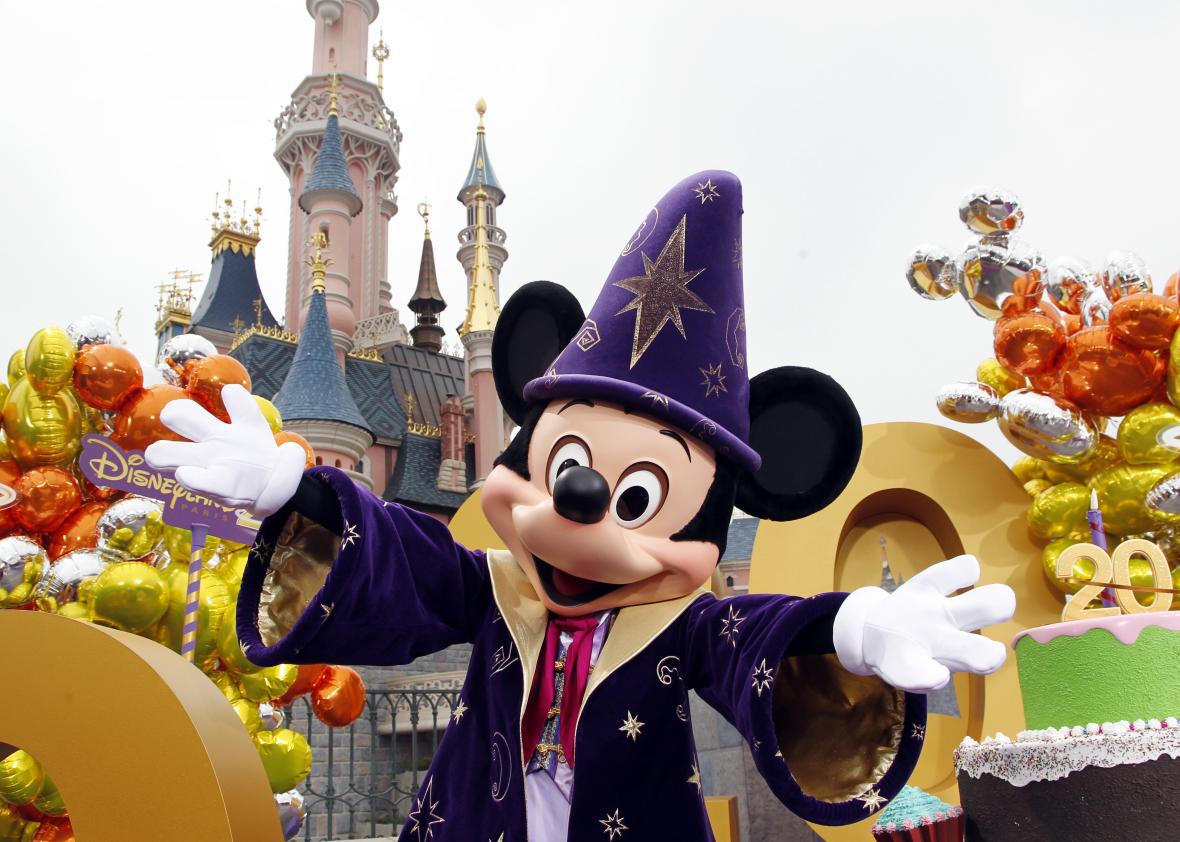Twenty miles outside Paris lies a 4,800-acre stretch of sparkling castles and magnificent roller coasters. They belong to Disneyland Paris, the massive, sprawling entertainment resort comprising multiple theme parks and hotels, as well as a golf course, a shopping complex, and dozens of other colorful attractions. The park’s fantastical appearance might not be the only thing that’s miragelike about it, however. Disney’s French outpost, which is already struggling to remain profitable, has just been hit with allegations that it is illegally overcharging visitors from abroad.
The European Commission announced Tuesday that it’s probing the park’s price differences for visitors who come from certain areas of Europe. It asked the French government to investigate whether Disneyland Paris is unfairly rigging prices for British and German customers, who claim that some park packages are more expensive when ordered from their countries than from France. In some cases, British and German customers allegedly pay €1,970 ($2,176) and €2,447 ($2,703) for the same premium package that costs a substantially smaller sum of €1,346 ($1,487) for French customers. EU rules prohibit companies from making customers pay different prices because of their nationality or residence, unless significantly different market conditions or holiday seasons are at play.
Though the park claims it’s simply offering promotions for different markets based on seasonality and booking patterns, an initial EU assessment found that French customers also benefit over non-French customers by receiving large family discounts, special rates, monthly payment options, and annual packages. British customers also pay 15 percent more for one-day tickets. European Commissioner Elzbieta Bienkowska said the discrepancies are significant, adding, “It is time to get to the bottom of this. … I struggle to see what objective justification there could be for these practices.” If the allegations are true, the park is in some major trouble according to European law. If the French government doesn’t decide to take action against the theme park, the European Commission could take France to court, the Financial Times reports.
But in a way, trouble is nothing new for the park: It’s been in turmoil, at least financially, since the very first day it opened. Disneyland Paris was built 23 years ago by the Walt Disney Co. on the heels of its blazing success in Florida and Japan—at the time, Disney World was wildly popular, Tokyo Disneyland emerged an instant hit, and the company’s new venture in France was expected to be just as prosperous, if not more so.* It wasn’t. The park lost $1 billion in its first two years of operation. It’s continued to flounder ever since, steadily hemorrhaging money and requiring several bailouts from its parent company just to stay afloat.
The main reason for the park’s lack of success would be comical, if it weren’t deeply sad: Disneyland Paris has simply never been widely accepted in its homeland of France. It banked on the majority of its profits coming from French visitors, but only around half its yearly visitors have actually been from France. This probably shouldn’t have shocked Disney. The park proudly flaunted itself as an American product in a country that notoriously dislikes American culture and scorns most American exports. Originally called Euro Disney, the whole theatrical production was famously deemed a “cultural Chernobyl” during its construction in 1992. And over the years, it’s lived up to the unfortunate name.
After the park’s opening day, which was expected to draw half a million visitors but pulled in a meager 25,000, Disney quickly realized it had overshot with its $5 billion project. Attempting to stem its stream of debt and win some more love from the French, the park changed its name to Disneyland Paris, threw in some French-sounding attractions, added alcohol to its menus, and shuffled out more outdoor restaurant space to appeal to French dining habits. But its problems ran deeper than an aesthetic offense to French people: The park also misunderstood French leisure habits, assuming that the French were willing to spend just as much money on lavish vacation activities as Americans, when in reality they were much stingier with their wallets and much less willing to take their children out of school for nonsummer vacations.
Given all this, it makes sense that Disneyland Paris would try to make yet another knees-on-the-ground plea for French people to love it—this time not by donning French dining practices, but by offering special ticket prices and promotional deals to appeal more to French spending habits. The park (whose chairman, in 1991, made the unfortunate boast, “My biggest fear is that we will be too successful”) has clearly not lived up to the tastes of its audience. Its special promotions for French customers may have softened this disgruntled market a bit. But if an investigation finds that the allegations of unfair pricing for non-French countries are true, Disneyland Paris’ plan has backfired. Even at the happiest place on Earth, everyone wants a square deal.
*Correction, July 30, 2015: This post originally misstated that Disneyland Paris opened 20 years ago. It was 23 years ago.
